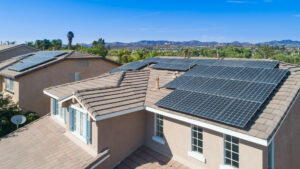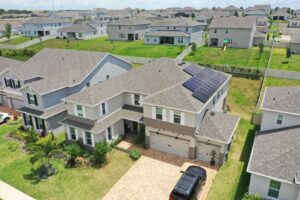A lot has changed since solar system installation was introduced. There are many reasons homeowners are choosing to go solar, but improving the environment and cutting costs are the most common. Whether it’s environmental, financial, or economic, the benefits for going solar are monumental. Here are five reasons going solar is beneficial for you and quickly gaining popularity in the United States.
Solar helps the environment and humanity. Solar power systems derive clean, pure energy from the sun. Installing solar panels helps avoid greenhouse gas emissions and reduces our dependence on fossil fuels as a whole. Fossil fuels emit harmful gases when they are burned to produce electricity. Coal and natural gas plants cause harmful air and water pollution in addition to having an adverse effect on climate change. Human health is affected daily by the burning of these fossil fuels. Solar energy is a renewable energy which helps improves public health. Replacing fossil fuels with renewable energy, such as solar power, can reduce the harmful effects fossil fuels have on human health and overall health care costs. Unlike other sources of energy, solar power also works during a drought or heat wave since these systems do not require the use of water to generate electricity.
You can reduce or eliminate energy bills. In sunny places, like here in Florida, solar panels produce an abundant amount of electricity for  your home. At times, you may generate more energy than you consume. This allows you to trade that energy with your utility company. Going solar makes economic sense when solar electricity costs less than grid electricity. Rates for electricity have been increasing. When you make your electricity costs more predictable by going solar, you also improve your expense forecasting and management capabilities.
your home. At times, you may generate more energy than you consume. This allows you to trade that energy with your utility company. Going solar makes economic sense when solar electricity costs less than grid electricity. Rates for electricity have been increasing. When you make your electricity costs more predictable by going solar, you also improve your expense forecasting and management capabilities.
It qualifies for tax credit. Solar energy panels are becoming increasingly more affordable for homeowners through federal, state and local tax breaks. Homeowners who purchase a solar system by the end of this year get a 30 percent tax credit. Next year, it falls to 26 percent, then 22 percent the next two years, ending with 10 percent the final year it’s available. Taking these tax incentives into account, it’s possible that you might recover your installation and equipment costs within 5 to 10 years.
Solar cost has dropped. The cost of going solar has dropped dramatically in recent years. In the past decade, prices have dropped more than 60 percent. Homeowners who are planning to sell their home could make a smart investment by retrofitting with solar panels now. Because there are no moving parts to break down, panels require almost no maintenance.
Solar systems are low maintenance. Grid-connected solar PV systems are generally very low maintenance. With occasional cleaning and a regular health-check by a licensed electrical contractor, solar panels should last around 25 years. It is likely the inverter will need to be replaced at least once in that time.

